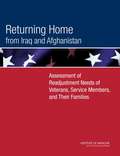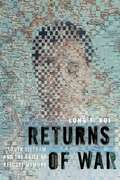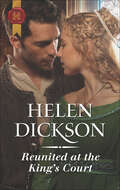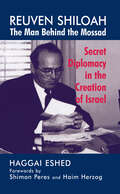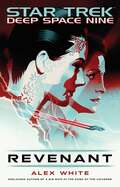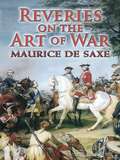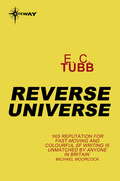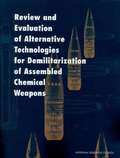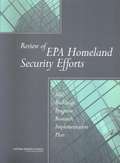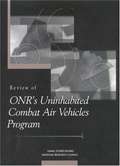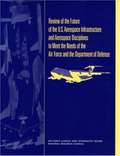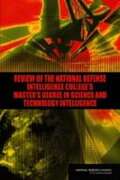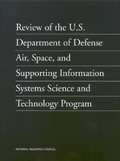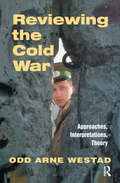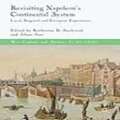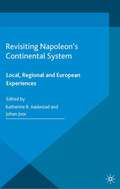- Table View
- List View
Returning Home from Iraq and Afghanistan
by Institute of MedicineAs of December 2012, Operation Enduring Freedom (OEF) in Afghanistan and Operation Iraqi Freedom (OIF) in Iraq have resulted in the deployment of about 2. 2 million troops; there have been 2,222 US fatalities in OEF and Operation New Dawn (OND)1 and 4,422 in OIF. The numbers of wounded US troops exceed 16,000 in Afghanistan and 32,000 in Iraq. In addition to deaths and morbidity, the operations have unforeseen consequences that are yet to be fully understood. In contrast with previous conflicts, the all-volunteer military has experienced numerous deployments of individual service members; has seen increased deployments of women, parents of young children, and reserve and National Guard troops; and in some cases has been subject to longer deployments and shorter times at home between deployments. Numerous reports in the popular press have made the public aware of issues that have pointed to the difficulty of military personnel in readjusting after returning from Iraq and Afghanistan. Many of those who have served in OEF and OIF readjust with few difficulties, but others have problems in readjusting to home, reconnecting with family members, finding employment, and returning to school. In response to the return of large numbers of veterans from Iraq and Afghanistan with physical-health and mental-health problems and to the growing readjustment needs of active duty service members, veterans, and their family members, Congress included Section 1661 of the National Defense Authorization Act for fiscal year 2008. That section required the secretary of defense, in consultation with the secretary of veterans affairs, to enter into an agreement with the National Academies for a study of the physical-health, mental-health, and other readjustment needs of members and former members of the armed forces who were deployed in OIF or OEF, their families, and their communities as a result of such deployment. The study consisted of two phases. The Phase 1 task was to conduct a preliminary assessment. The Phase 2 task was to provide a comprehensive assessment of the physical, psychologic, social, and economic effects of deployment on and identification of gaps in care for members and former members, their families, and their communities. The Phase 1 report was completed in March 2010 and delivered to the Department of Defense (DOD), the Department of Veterans Affairs (VA), and the relevant committees of the House of Representatives and the Senate. The secretaries of DOD and VA responded to the Phase 1 report in September 2010. Returning Home from Iraq and Afghanistan: Assessment of Readjustment Needs of Veterans, Service Members, and Their Families fulfills the requirement for Phase 2.
Returns of War: South Vietnam and the Price of Refugee Memory (Nation of Nations #32)
by Long T. BuiThe legacy and memory of wartime South Vietnam through the eyes of Vietnamese refugees In 1975, South Vietnam fell to communism, marking a stunning conclusion to the Vietnam War. Although this former ally of the United States has vanished from the world map, Long T. Bui maintains that its memory endures for refugees with a strong attachment to this ghost country. Blending ethnography with oral history, archival research, and cultural analysis, Returns of War considers how the historical legacy of a nation that only existed for twenty years is being kept alive by its dispersed stateless exiles.Returns of War argues that Vietnamization--as Richard Nixon termed it in 1969--and the end of South Vietnam signals more than an example of flawed American military strategy, but a larger allegory of power, providing cover for U.S. imperial losses while denoting the inability of the (South) Vietnamese and other colonized nations to become independent, modern liberal subjects. Bui argues that the collapse of South Vietnam under Vietnamization complicates the already difficult memory of the Vietnam War, pushing for a critical understanding of South Vietnamese agency beyond their status as the war’s ultimate “losers.” Examining the lasting impact of Cold War military policy and culture upon the “Vietnamized” afterlife of war, this book weaves questions of national identity, sovereignty, and self-determination to consider the generative possibilities of theorizing South Vietnam as an incomplete, ongoing search for political and personal freedom.
Reunited at the King's Court (Mills And Boon Historical Ser.)
by Helen DicksonKept apart by duty…Reunited by love?Arlette Dryden has never forgotten William Latham, the Royalist soldier who accompanied her to safety while the Battle of Worcester raged. Or how her heart broke when he left. Now it’s the exiled king’s return parade, and stunned Arlette locks eyes with her charismatic cavalier again. She’s still irresistibly drawn to him, but as both have convenient betrothals beckoning, can their long-held passion conquer all?
Reunited with the Major: The Rake To Rescue Her The Soldier's Dark Secret Reunited With The Major (Regency Brides of Convenience #3)
by Anne HerriesFor honor…Major Harry Brockley gave up on love long ago, when he lost his heart to his colonel's wife, Samantha Scatterby. Now, years later, Brock agrees to a loveless marriage to save a damsel in distress—only to have Sam reappear in his life!…or for love?Courageous Sam, now a widow, is happy to see the one man she's secretly adored for years, even if he is engaged to someone else. And when Brock seeks Sam's help, she's powerless to resist this chance to be reunited with her handsome major…
Reuven Shiloah - the Man Behind the Mossad: Secret Diplomacy in the Creation of Israel
by Haggai EshedThis is the story of Reuven Shiloah - the man who established the Mossad, and laid the foundations for the intelligence community of the State of Israel. The book is based on private archives, and interviews with people who worked closely with Shiloah both in Israel and abroad.
Revenant (Star Trek: Deep Space Nine)
by Alex WhiteAn all-new novel based on the landmark TV series Star Trek: Deep Space Nine from the acclaimed author of A Big Ship at the Edge of the Universe!Jadzia Dax has been a friend to Etom Prit, the Trill Trade Commissioner, over two lifetimes. When Etom visits Deep Space Nine with the request to rein in his wayward granddaughter Nemi, Dax can hardly say no. It seems like an easy assignment: visit a resort casino while on shore leave, and then bring her old friend Nemi home. But upon arrival, Dax finds Nemi has changed over the years in terrifying ways…and the pursuit of the truth will plunge Dax headlong into a century&’s worth of secrets and lies! ™, ®, & © 2021 CBS Studios, Inc. STAR TREK and related marks and logos are trademarks of CBS Studios, Inc. All Rights Reserved.
Revenge: A Thrilling Suspense Novel (Omega Sector: Critical Response #5)
by Janie CrouchOne top-notch agent will do whatever it takes to protect a beautiful woman from his past in this story from USA TODAY bestselling author Janie Crouch! Originally published as Overwhelming Force.Despite an illustrious career as a top hostage negotiator, Joe Matarazzo is haunted by the past. When Joe's exes begin to fall victim to a violent stalker, Joe seeks the help of Laura Birchwood—a lawyer and the woman he once loved. Despite old wounds, Laura agrees to help Joe find out who's framing him. And while they expect to be met with danger, they're unprepared for passion that still burns strong, and their determination to give what was between them a second chance.
Reveries on the Art of War
by Maurice De Saxe Gen. Thomas R. PhillipsAt the age of twelve, Dresden-born Maurice de Saxe (1696-1750) entered the Saxon army, beginning a long and successful military career that culminated in his promotion to Marshal of France, where he retained full command of the main army in Flanders directly under Louis XV. Again and again, de Saxe achieved enormous victories over his enemies, becoming one of the greatest military leaders of the eighteenth century. Combining his memoirs and general observations with brilliant military thinking, Reveries on the Art of War was written in a mere thirteen days. Introducing revolutionary approaches to battles and campaigning at a time of changing military tactics and leadership styles, it stands as a classic of early modern military theory.De Saxe's Reveries offered numerous procedural innovations for raising and training troops. His descriptions for establishing field camps were soon standard procedure. His ideas advanced weapon technology, including the invention of a gun specially designed for infantrymen and the acceptance of breech-loading muskets and cannons. De Saxe heightened existing battle formations by introducing a specific attack column that required less training, and he rediscovered a military practice lost since the ancient Romans -- the art of marching in cadence. He even delved into the minds and emotions of soldiers on the battlefield, obtaining a deeper understanding of their daily motivations.Written by a military officer of great acumen, Reveries on the Art of War has deeply impacted modern military tactics. Enduringly relevant, this landmark work belongs in the library of anyone interested in the history, tactics, and weapons of European warfare.
Reverse Universe
by E.C. TubbOriginally published in 1952, Reverse Universe is another classic from pulp master E. C. Tubb, writing as Volsted Gridban.
Review Of The Army's Technical Guides On Assessing And Managing Chemical Hazards To Deployed Personnel
by Subcommittee on the Toxicological Risks to Deployed Military PersonnelTo guide mission planning, military decision makers need information on the health risks of potential exposures to individual soldiers and their potential impact on mission operations. To help with the assessment of chemical hazards, the U.S. Army Center for Health Promotion and Preventive Medicine developed three technical guides for characterizing chemicals in terms of their risks to the mission and to the health of the force. The report reviews these guides for their scientific validity and conformance with current risk-assessment practices. The report finds that the military exposure guidelines are appropriate (with some modification) for providing force health protection, but that for assessing mission risk, a new set of exposure guidelines is needed that predict concentrations at which health effects would degrade the performance of enough soldiers to hinder mission accomplishment.
Review and Evaluation of Alternative Chemical Disposal Technologies
by National Research CouncilIn 1994 the National Research Council published Recommendations for the Disposal of Chemical Agents and Munitions, which assessed the status of various alternative destruction technologies in comparison to the Army's baseline incineration system. The volume's main finding was that no alternative technology was preferable to incineration but that work should continue on the neutralization technologies under Army consideration.In light of the fact that alternative technologies have evolved since the 1994 study, this new volume evaluates five Army-chosen alternatives to the baseline incineration system for the disposal of the bulk nerve and mustard agent stored in ton containers at Army sites located in Newport, Indiana, and Aberdeen, Maryland, respectively. The committee assessed each technology by conducting site visits to the locations of the technology proponent companies and by meeting with state regulators and citizens of the affected areas. This volume makes recommendations to the Army on which, if any, of the five technologies has reached a level of maturity appropriate for consideration for pilot-scale testing at the two affected sites.
Review and Evaluation of Alternative Technologies for Demilitarization of Assembled Chemical Weapons
by National Research CouncilThe National Academies Press (NAP)--publisher for the National Academies--publishes more than 200 books a year offering the most authoritative views, definitive information, and groundbreaking recommendations on a wide range of topics in science, engineering, and health. Our books are unique in that they are authored by the nation's leading experts in every scientific field.
Review of Acute Human-Toxicity Estimates for Selected Chemical-Warfare Agents
by Subcommittee on Toxicity Values for Selected Nerve Vesicant AgentsA Review of Acute Human-Toxicity Estimates for Selected Chemical-Warfare Agents
Review of Department of Defense Test Protocols for Combat Helmets
by Committee on Review of Test Protocols Used by the DoD to Test Combat HelmetsCombat helmets have evolved considerably over the years from those used in World War I to today's Advanced Combat Helmet. One of the key advances was the development of aramid fibers in the 1960s, which led to today's Kevlar-based helmets. The Department of Defense is continuing to invest in research to improve helmet performance, through better design and materials as well as better manufacturing processes. Review of the Department of Defense Test Protocols for Combat Helmets considers the technical issues relating to test protocols for military combat helmets. At the request of the DOD Director of Operational Test and Evaluation, this report evaluates the adequacy of the Advanced Combat Helmet test protocol for both first article testing and lot acceptance testing, including its use of the metrics of probability of no penetration and the upper tolerance limit (used to evaluate backface deformation). The report evaluates appropriate use of statistical techniques in gathering data; adequacy of current helmet testing procedures; procedures for the conduct of additional analysis of penetration and backface deformation data; and scope of characterization testing relative to the benefit of the information obtained.
Review of EPA Homeland Security Efforts: Safe Buildings Program Research Implementation Plan
by Committee on Safe Buildings ProgramThe report examines the Environmental Protection Agency’s three-year plan for a comprehensive response to a chemical or biological attack on a civilian or public sector facility. The report states that EPA has correctly identified the essential major research areas (detection, containment, decontamination, and disposal) but calls for an initial focus on decontamination and disposal efforts and a longer term research program.
Review of ONR's Uninhabited Combat Air Vehicles Program
by Committee for the Review of ONR's Uninhabited Combat Air Vehicles ProgramThe National Academies Press (NAP)--publisher for the National Academies--publishes more than 200 books a year offering the most authoritative views, definitive information, and groundbreaking recommendations on a wide range of topics in science, engineering, and health. Our books are unique in that they are authored by the nation's leading experts in every scientific field.
Review of Risk Assessment Work Plan for the Medical Countermeasures Test and Evaluation Facility at Fort Detrick: A Letter Report
by Board on Life SciencesAt the U.S. Army's request the National Research Council (NRC) established the Committee to Review Risk Assessment Approaches for the Medical Countermeasures Test and Evaluation (MCMT&E) facility at Fort Detrick, in Frederick, Maryland. The committee was charged with reviewing a proposed approach to preparing a risk assessment for the new biocontainment laboratory at the base. Review of Risk Assessment Work Plan for the Medical Countermeasures Test and Evaluation Facility is the second letter report on the Army contractor's proposed work plan for conducting the risk assessment.
Review of the Future of the U.S. Aerospace Infrastructure and Aerospace Engineering Disciplines to Meet the Needs of the Air Force and the Department of Defense
by Committee on the Future of the U.S. Aerospace Infrastructure Aerospace Engineering Disciplines to Meet the Needs of the Air Force the Department of DefenseA Review of the Future of the U.S. Aerospace Infrastructure and Aerospace Engineering Disciplines to Meet the Needs of the Air Force and the Department of Defense
Review of the National Defense Intelligence College's Master's Degree in Science and Technology Intelligence
by Committee for the Review of the Master's Degree Program for Science Technology Intelligence ProfessionalsThe National Research Council (NRC) was asked by the National Defense Intelligence College (NDIC) to convene a committee to review the curriculum and syllabi for their proposed master of science degree in science and technology intelligence. The NRC was asked to review the material provided by the NDIC and offer advice and recommendations regarding the program's structure and goals of the Master of Science and Technology Intelligence (MS&TI) program. The Committee for the Review of the Master's Degree Program for Science and Technology Professionals convened in May 2011, received extensive briefings and material from the NDIC faculty and administrators, and commenced a detailed review of the material. This letter report contains the findings and recommendations of the committee. "Review of the National Defense Intelligence College's Master's Degree in Science and Technology Intelligence" centers on two general areas. First, the committee found that the biological sciences and systems engineering were underrepresented in the existing program structure. Secondly, the committee recommends that the NDIC faculty restructure the program and course learning objectives to focus more specifically on science and technology, with particular emphasis on the empirical measurement of student achievement. Given the dynamic and ever-changing nature of science and technology, the syllabi should continue to evolve as change occurs.
Review of the U.S. Department of Defense Air, Space, and Supporting Information Systems Science and Technology Program
by Technology Program Committee on Review of the U.S. Department of Defense Air Space Systems ScienceA Review of the U.S. Department of Defense Air, Space, and Supporting Information Systems Science and Technology Program
Review of the U.S. Navy's Exposure Standard for Manufactured Vitreous Fibers
by Subcommittee on Manufactured Vitreous FibersThe National Academies Press (NAP)--publisher for the National Academies--publishes more than 200 books a year offering the most authoritative views, definitive information, and groundbreaking recommendations on a wide range of topics in science, engineering, and health. Our books are unique in that they are authored by the nation's leading experts in every scientific field.
Reviewing the Cold War: Approaches, Interpretations, Theory (Cold War History)
by Odd Arne WestadSince the cold war ended, it has become an international field of study, with new material from China, the former Soviet Union and Europe. This volume takes stock of where these new materials have taken us in our understanding of what the cold war was about and how we should study it.
Revisiting Napoleon’s Continental System
by Katherine B. Aaslestad Johan JoorNapoleonic warfare spread to the high seas, harbors and marketplaces across Europe and the Atlantic through the Continental System. This volume addresses the illicit commerce, new merchant networks, 'daily life', and tensions with neutral states generated by Anglo-French economic warfare. It also reveals the contradictions inherent in the Napoleonic Empire - at once rational and progressive, but also coercive and exploitative. Regional and urban case studies offer a more complete understanding of the significance of economic warfare during the Napoleonic era, and explore the experiences and consequences of the conflict through several key themes: a re-evaluation of the historiography of the Continental System, the uneven power triangle of the French, British and neutral powers, and the strategies of merchants and smugglers to adapt to or circumvent the system. Transnational case studies underscore the vulnerability and ingenuity of Europeans as they faced transformative social and economic challenges.
Revisiting Napoleon’s Continental System: Local, Regional and European Experiences (War, Culture and Society, 1750-1850)
by K. Aaslestad J. JoorEconomic warfare during the Napoleonic era transformed international commerce; redirecting trade and generating illicit commerce. This volume re-evaluates the Continental System through urban and regional case studies that analyze the power triangle of the French, British and neutral powers and their strategies to adapt to trade restrictions.
Revisiting Prussia's Wars against Napoleon
by Karen Hagemann Pamela SelwynIn 2013, Germany celebrated the bicentennial of the so-called Wars of Liberation (1813-1815). These wars were the culmination of the Prussian struggle against Napoleon between 1806 and 1815, which occupied a key position in German national historiography and memory. Although these conflicts have been analyzed in thousands of books and articles, much of the focus has been on the military campaigns and alliances. Karen Hagemann argues that we cannot achieve a comprehensive understanding of these wars and their importance in collective memory without recognizing how the interaction of politics, culture, and gender influenced these historical events and continue to shape later recollections of them. She thus explores the highly contested discourses and symbolic practices by which individuals and groups interpreted these wars and made political claims, beginning with the period itself and ending with the centenary in 1913.
